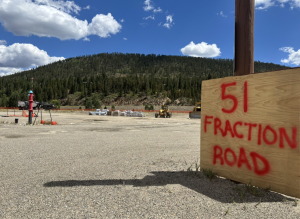New Colorado legislation aims to protect rights of mobile home park residents

Michelle Lyman / mlyman@everythingsummit.com
DILLON — Gov. Jared Polis on Tuesday signed two bills that aim to expand the rights of mobile home park residents.
Summit County’s state Rep. Julie McCluskie was a prime sponsor on the Mobile Home Park Act Updates bill and a co-sponsor on the Mobile Home Park Residents Opportunity to Purchase bill. She said the legislation built off an effort last year to give local governments enforcement power over the parks.
“Last year’s bill was the first of its kind and rather dramatic just in that it had reestablished the Mobile Home Park Owners Act that had been passed back in the ’80s,” McCluskie said. “Since passing that, over the course of the last year, a number of stakeholders came together to continue talking about the needs of those folks who own mobile homes but don’t necessarily own the land that they’re on in the mobile home park.”
McCluskie said one of the new bills includes fair water billing practices to address a letter she received from Leadville that said mobile home owners had to ration their water, including limiting how many times per day they could flush their toilets. She said the bill is a step forward in making sure mobile home owner’s rights are protected and that they’re able to exercise those rights without fear of retaliation — such as eviction.
McCluskie said she has worked to make sure evictions don’t occur due to minor offenses and that the bill includes language that clarifies what a mobile home owner can expect and what their rights are.
“… It is such a unique relationship for these mobile home owners who don’t own the land their mobile home sits on,”McCluskie said. “… I do think that these bills, last year’s and this year’s, were kind of the first of their kind to address the rights of mobile home owners and to say that while you may not own the land, you do own the home, and there are some rights that we should ensure are protected here at the state.”
Mobile homes are important in the High Country and rural Colorado as an affordable housing option, McCluskie said.
“This was an opportunity for us to stand up for mobile home owners in the state, and we need to keep the conversation going,” McCluskie said while noting “there are plenty of good mobile home park owners.”
“If these bills kind of equalize that power relationship and help mobile home owners feel safer and better about home ownership, that’s great,” she said. “I hope that we continue the dialogue.”
Tawny Peyton, executive director of the Rocky Mountain Home Association and Utah Housing Alliance, said the association felt the bills were not needed or justified.
Peyton called the bills overarching, potentially unconstitutional and detrimental to landlords.
“In addition, they unfairly and improperly singled out our industry,” Peyton wrote in an email. “We were able to negotiate several amendments but did not come close to getting everything we asked for. Enough amendments were added to the bill that we did agree to change our original opposed position to neutral.”
Peyton said that while the bills will help residents of mobile home parks, there is no “upside” for landlords. During the COVID-19 pandemic, she said the association is concerned about additional burdens for park owners who also are experiencing financial hardships.
“Throughout the process, we were presented with unacceptable proposals and negotiated to make them more workable, but we’re certainly not thrilled with more regulation of our industry,” Peyton wrote.
Peyton said the passage of last year’s bill has a projected cost of more than $800,000 per year to the manufactured and modular home industry, which is the largest provider of unsubsidized affordable housing.
“Our hope now is that we are given time to implement all of the new changes from the past two years and see how well the changes work at addressing the issues that they were created to resolve,” Peyton wrote.
Jack Regenbogen, senior attorney at the Colorado Center on Law and Policy, was heavily involved in the legislative process of the two bills. Regenbogen said much of his work focuses on housing for Coloradans who are experiencing poverty.
Regenbogen cited the challenges that mobile home owners experience due to the partial ownership of where they live — owning the home but not the land — and said it can be extremely difficult, if not impossible, for them to leave as it can cost upward of $10,000 to move a mobile home. When people are evicted, he said they often abandon their mobile home and forfeit their primary asset.
Regenbogen said the two bills signed Tuesday are intended to bolster housing security and protect the rights of mobile home park residents, including raising the threshold for an eviction, giving people more time and opportunities to resolve an issue before they can be evicted and requiring that more notice be given to residents if the park will undergo a change of use, requiring residents to be evicted. There also are anti-retaliation protections and right-to-privacy establishments.
“I think it’s going to go a long way in terms of protecting the rights of mobile home residents and ensuring that they’re treated fairly,” Regenbogen said.
Regenbogen said he is most excited about the eviction protections the legislation provides.
“Right now, post COVID, we’re looking at an unprecedented eviction crisis,” he said. “Anything that we can do to help mitigate the adverse consequences of what is expected to occur as courts resume holding eviction hearings is going to be incredibly valuable.”

Support Local Journalism

Support Local Journalism
As a Summit Daily News reader, you make our work possible.
Summit Daily is embarking on a multiyear project to digitize its archives going back to 1989 and make them available to the public in partnership with the Colorado Historic Newspapers Collection. The full project is expected to cost about $165,000. All donations made in 2023 will go directly toward this project.
Every contribution, no matter the size, will make a difference.



